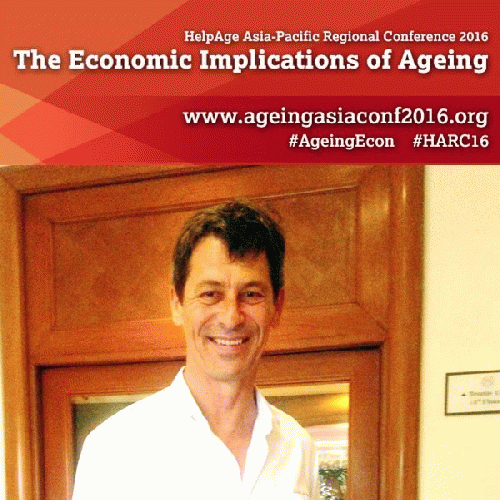
Dr John Beard, Director, WHO Dept of Ageing and Life-course
(Image by CNS (Citizen News Service)) Details DMCA
(CNS): With declining fertility rates and increasing life expectancy, the proportion of people aged 60 and over is growing globally. There are currently 900,868 million people aged 60 or over worldwide (12.5% of the global population). Nearly two-thirds (533 million) of them are in the Asia Pacific region and it is at the forefront of the global phenomenon of population ageing. Due to their longer life expectancy, women constitute the majority (53.5%) of the population aged 60 or older in this region. In 2013, there were 229 million older men and 261 million women above 60 in the Asia-Pacific region.
The proportion of older women increases even more with increasing age, rising to 60% above age 80. 75% of the region's centenarians are women. In Philippines there were 136 women aged 65 and older for every 100 men in 2015. Among those aged 75 and above there were 162 women for every 100 men.
This feminisation of ageing is an important and yet highly neglected women's issue. It has profound and far-reaching social, economic and political implications. The gender dimensions of ageing are in the fore front of the HelpAge Asia-Pacific Regional Conference 2016, being currently held in Hanoi, on the theme of 'The Economic Implications of Ageing'. There is a general consensus that female senior citizens are more disadvantaged than their male counterparts.
In an exclusive interview given to CNS (Citizen News Service), Dr John Roland Beard, Director of Department of Ageing and Life-Course at the World Health Organization (WHO), agreed that there are many issues that specifically confront older women. Women tend to live longer than men and also tend to get married to men older than themselves. So a higher proportion of older women are likely to be widowed without adequate income support. Economically, women in many countries do not have the opportunity of building the same social security safety nets as is available for men. Men are often the primary earner in the family, and when the man dies, the pension amount (if any) is reduced or becomes totally inaccessible to the widow. In some parts of the world, like in Africa, women have no ownership rights over property, and when the husband dies the widow is reduced to penury.
Sexuality and ageing
Dr John Beard lamented that apart from economic and health problems, they have to grapple with isolation and loneliness too. In his candid opinion, "There is also the issue of sexuality in older people. Older people too have sexual rights just as younger people do. But sexual rights of senior citizens are not spoken about at all and society holds to deny that they too like to have sex. This becomes particularly harder for older women who live alone. This issue should not be brushed under the carpet."
Women do not have cushion of security in old age that men have
Thelma Kay, former Chief of the Social Development Division, UNESCAP and Senior Advisor on Ageing Issues, Ministry of Social and Family Development, Singapore, echoed similar sentiments. "Many women do not work and even for those who work, their careers are often interrupted due to raising of children and other family issues. As pensions are usually built up over working years, women often do not have that cushion of security in their old age that men have".
(Note: You can view every article as one long page if you sign up as an Advocate Member, or higher).





